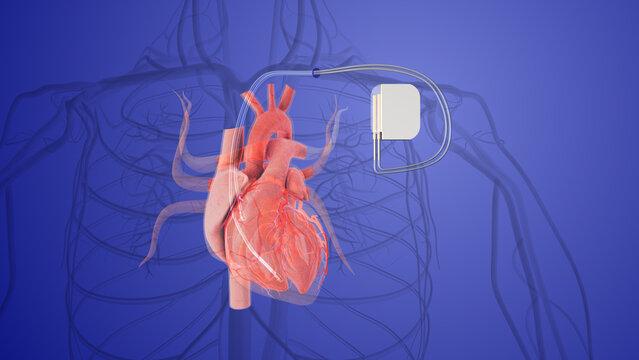Cardiac Pacemaker Market Demand Increasing with Rising Arrhythmia Cases and Minimally Invasive Solutions

The cardiac pacemaker market has seen significant evolution over the past decade, driven by advancements in medical technology, an aging global population, and increasing prevalence of cardiovascular diseases (CVDs). As life expectancy rises and lifestyles become increasingly sedentary, the demand for life-sustaining cardiac devices continues to grow. The global cardiac pacemaker market reflects this trend with expanding innovation, shifting regional dynamics, and ongoing regulatory developments.
Market Overview
A cardiac pacemaker is a small device implanted in the chest or abdomen to help control abnormal heart rhythms. It uses electrical pulses to prompt the heart to beat at a normal rate. These devices are critical for patients suffering from arrhythmias, including bradycardia (slow heart rate) and heart block.
The global market for cardiac pacemakers was valued at approximately USD 4.5 billion in 2023 and is projected to reach USD 6.5 billion by 2030, growing at a CAGR of 5.4% during the forecast period. This growth is largely attributed to technological innovation, such as the development of leadless pacemakers, and an increasing number of surgical procedures.
Key Market Drivers
1. Rising Prevalence of Cardiovascular Diseases
CVDs remain the leading cause of death globally. According to the World Health Organization, over 17.9 million people die each year due to cardiovascular-related complications. This surge has significantly increased the demand for cardiac devices like pacemakers.
2. Aging Global Population
As the global population continues to age, the incidence of heart rhythm disorders rises. Countries like Japan, Germany, and Italy have notably high proportions of elderly individuals, many of whom require cardiac pacing.
3. Technological Advancements
One of the most transformative developments in this market is the leadless pacemaker. Unlike traditional devices, these pacemakers do not require wired leads, reducing complications and recovery time. Companies like Medtronic have pioneered innovations like the Micra TPS, a leadless pacemaker that has gained widespread adoption due to its minimally invasive nature.
4. Improved Healthcare Infrastructure in Emerging Economies
Developing nations are witnessing improvements in healthcare accessibility and spending. Countries like India, China, and Brazil are investing in advanced healthcare systems, increasing the adoption of cardiac devices among their growing middle-class populations.
Market Segmentation
By Product Type:
-
Single Chamber Pacemakers
-
Dual Chamber Pacemakers
-
Biventricular Pacemakers (CRT-P)
Dual chamber pacemakers currently dominate the market due to their versatility and higher efficacy in treating multiple types of arrhythmias.
By Technology:
-
Implantable Pacemakers
-
External Pacemakers
Implantable pacemakers account for the majority of market revenue, offering long-term solutions with fewer complications.
By End-User:
-
Hospitals
-
Cardiac Centers
-
Ambulatory Surgical Centers
Hospitals remain the largest segment, given their access to skilled cardiac surgeons and advanced equipment.
Regional Insights
North America holds the largest market share due to high healthcare spending, early adoption of new technologies, and favorable reimbursement policies. The U.S. continues to lead the way with robust R&D and key market players such as Boston Scientific and Abbott.
Europe is also a major market, particularly in countries like Germany, the UK, and France, where aging populations and strong medical device regulations support steady growth.
Asia-Pacific is emerging as the fastest-growing region. China and India, with their large populations and rising cardiovascular disease rates, are key markets for future growth. Furthermore, local manufacturing and government initiatives to boost domestic medical device production are helping to reduce costs and expand access.
Competitive Landscape
The cardiac pacemaker market is highly competitive, with a few dominant players and several emerging ones. Key market participants include:
-
Medtronic
-
Abbott Laboratories
-
Boston Scientific
-
BIOTRONIK
-
LivaNova
These companies are focused on mergers, acquisitions, product launches, and technological collaboration to enhance their market positions.
Challenges and Opportunities
Despite the positive outlook, the market faces challenges such as high device costs, reimbursement issues in some regions, and risks associated with implantable devices like infections or device failure. However, these challenges also present opportunities for innovation, especially in biocompatible materials, AI-based monitoring, and remote patient management systems.
Conclusion
The cardiac pacemaker market is poised for steady growth, fueled by medical advancements and increasing health awareness. As innovation continues to reshape the landscape, the focus will shift toward more patient-centric solutions—smaller, smarter, and safer pacemakers that enhance both quality of life and long-term health outcomes. Market players who prioritize R&D and global outreach will be best positioned to capitalize on this evolving sector.
- Art
- Causes
- Crafts
- Dance
- Drinks
- Film
- Fitness
- Food
- Giochi
- Gardening
- Health
- Home
- Literature
- Music
- Networking
- Altre informazioni
- Party
- Religion
- Shopping
- Sports
- Theater
- Wellness


